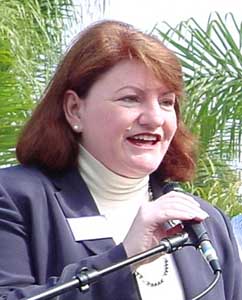-
- Constitutional amendment could leave couples in legal limbo
- AIDS group says brochures removed at health fair
- School to receive sensitivity training after lesbian kicked out of gym class
- Group asks Cambridge to wait 180 days for marriage
- MD mayor apologizes for drag-queen slur
- Senate confirms general criticized for leadership
- School discusses tolerance after cafeteria kiss
- Public split on whether gays can change sexual orientation
- High school senior challenges rule
- Protesters target Cirque du Soleil
- National News Briefs
- World News Briefs
san diego
Gay politicians gather
Share international perspectives on GLBT rights
Published Thursday, 27-Nov-2003 in issue 831
The Massachusetts marriage ruling and the race for the Democratic presidential nomination dominated hallway conversation as some 200 people gathered here Nov. 20-23 for the 19th Annual Conference of the International Network of Lesbian & Gay Officials (INLGO).
“This is about networking; it’s about knowing we are not alone,” said organizer Toni Atkins, who sits on the San Diego City Council.
“It’s about a network of people out there who understand the issues of being a public servant, of representing constituents and voters, and trying to be a good elected official — and at the same time we represent a minority: the LGBT people across the country. So we do double duty — and we want to support each other and share information with each other.”
Atkins said last year’s conference helped attendees go home and deal with such issues as “gay marriage or civil unions, the Boy Scouts, needle exchange and medical marijuana.”
“These were all topics we discussed last year to give us the support, strength and ability to articulate our positions to the general public,” she said.
One of the weekend’s best-attended sessions was entitled “Gay Unions — An International Perspective.”
“I’ve learned that it’s much more complicated to get a [partnership] law in the United States than in Germany or other European countries,” Volker Beck, a member of Germany’s Federal Assembly, said in interview.
“In Europe, it’s clear to the majority of citizens that we have the right to legal recognition,” he said. “The European countries differ a little bit on how far they went. The Netherlands and Belgium opened marriage for gay and lesbian people. In other countries, we decided that we get the full equal rights under a different name — registered partnership.
“In Germany, the people in the churches believe that gay and lesbian people should get their rights, and other people do also. It’s only the Catholic Church where the bishops are speaking out against it, but Catholic people in the churches, the majority are behind all the issues of the gay and lesbian movement. It took us 10 years to pursue [domestic partnership] but we were successful.”
Asked to advise Americans on how to achieve equal rights for same-sex couples, Beck said: “I think you should ask for equality as a Republican principle, as a principle of your Constitution, and as a patriotic subject. But you always should take what you get. So, I think you should be clear in arguing for principle but very realistic and pragmatic to avoid the right wing overruling your progress. You have to do everything to avoid an amendment to the Constitution [banning same-sex marriage].”
For some conference attendees, their sexual orientation has never harmed their political careers, even in locations where one might not expect that to be the case.
“It really was never an issue in any of the campaigns that I ran,” said Michael Nelson, mayor of Carrboro, N.C., for the past eight years. “They really were more concerned about my positions on environmental issues and land-use management and the financial aspects of the town.”
Nelson said gay people who want to run for public office should “just do it.”
“Go out and run,” he said. “Don’t assume that people are prejudiced against gay people. People are really very fair. People make their decisions on who to vote for based on common sense — if a candidate focuses on the issues, if a candidate reaches out to voters, meets them face to face. People aren’t as prejudiced as we think they are often. I think that’s a self-fulfilling prophecy.”
Sometimes openly gay office-holders’ most notable conflicts are with gay activists, said Kyle Rae, a member of the Toronto City Council for 12 years.
“For example, public sex,” Rae said. “Gay activists think we should be able to have sex in our bars. And they think I should be able to protect that. Well, I can’t. I can’t tell the police where they do their job. They follow the federal criminal code. I’ll support you in trying to remove those laws, for example the bawdyhouse laws, which have been used against bathhouses in the past. But it’s not in my mandate. I can’t direct the police on that.”
In 2002, Rae was sued for libel by seven city cops after he denounced a raid on a women’s “Pussy Palace” night at a gay bathhouse. Rae defamed the officers by calling them “rogue cops,” “goons,” “renegades” and “cowboys,” a jury determined. A city insurance policy paid out $131,000 to the aggrieved officers.
“The jury wouldn’t allow the police in Toronto to be wrong,” Rae said.
“The cops whined about how I hurt their feelings.”
Rae is another gay politician for whom sexual orientation has never been an obstacle.
“I think [my constituents] are very proud to have an openly gay member of Council representing them,” he said. “I think it’s part of their feeling a sophisticated, urbane part of the city. There’s also the honesty factor. If you’re honest about being gay, you’re out about being gay, you haven’t got anything to hide, and you’ve chosen not to hide. That’s important.”
|
|
Copyright © 2003-2025 Uptown Publications


